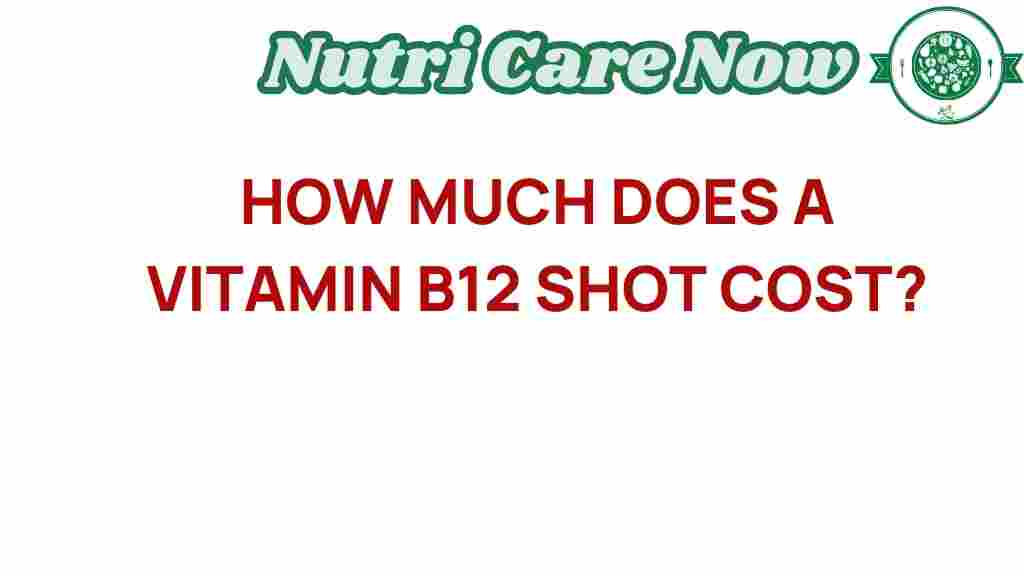The Hidden Costs of Vitamin B12 Shots: Are They Worth It?
Vitamin B12 is a vital nutrient that plays a significant role in our overall health and wellness. It is crucial for nerve function, the production of DNA and red blood cells, and the maintenance of healthy brain function. While many people can obtain adequate amounts of Vitamin B12 through their diet, others may need to consider supplementation, particularly through injections. However, it’s essential to examine the cost of Vitamin B12 shots alongside their health benefits to determine if they are worth the investment.
Understanding Vitamin B12 and Its Importance
Vitamin B12, also known as cobalamin, is primarily found in animal products such as meat, fish, eggs, and dairy. Vegetarians and vegans, as well as individuals with certain health conditions, may struggle to get enough B12 from their diets alone. Here are some health benefits associated with adequate Vitamin B12 intake:
- Supports nerve health and function
- Helps in the formation of red blood cells
- Contributes to DNA synthesis
- May improve mood and energy levels
- Reduces the risk of certain neurological disorders
What Are Vitamin B12 Injections?
Vitamin B12 injections are a common method of supplementation, especially for individuals who have difficulty absorbing the vitamin through their digestive systems. These injections deliver a high dose of B12 directly into the muscle, allowing for immediate availability and utilization by the body. While injections can be effective, they also come with considerations regarding their cost and necessity.
Cost Analysis of Vitamin B12 Shots
When evaluating the cost of Vitamin B12 shots, several factors come into play:
- Price per Injection: The average cost of a Vitamin B12 shot can range from $15 to $50, depending on the healthcare provider and location.
- Frequency of Injections: Many individuals require injections on a weekly or monthly basis, which can add up significantly over time.
- Healthcare Provider Fees: In addition to the cost of the injection, there may be additional fees for the healthcare provider’s services.
- Insurance Coverage: Some insurance plans may cover the cost of B12 injections, while others may not, impacting the out-of-pocket expenses.
As you can see, the cost of Vitamin B12 injections can quickly escalate, particularly for those needing long-term supplementation. It’s essential to weigh these expenses against the potential health benefits.
Alternatives to Injections
For individuals who find the cost of injections prohibitive, there are alternative ways to increase Vitamin B12 levels:
- Dietary Sources: Incorporating more B12-rich foods into your diet can be an effective way to boost levels naturally. Foods rich in Vitamin B12 include:
- Meat (beef, poultry, pork)
- Fish (salmon, tuna)
- Dairy products (milk, cheese, yogurt)
- Eggs
- Oral Supplements: Vitamin B12 supplements are available in various forms, including pills, sublingual tablets, and gummies. These are often more affordable than injections and can be effective for many individuals.
- Fortified Foods: Some cereals, plant-based milks, and nutritional yeast are fortified with Vitamin B12, making them an excellent option for those following a vegetarian or vegan diet.
Step-by-Step Guide: How to Decide on Vitamin B12 Injections
Before opting for Vitamin B12 injections, it’s crucial to follow a structured decision-making process:
- Consult a Healthcare Provider: Schedule an appointment with your doctor to discuss your symptoms and concerns. They can evaluate your Vitamin B12 levels through blood tests.
- Consider Dietary Changes: If you have a deficiency, consider adjusting your diet to include more Vitamin B12-rich foods.
- Explore Supplements: Discuss oral supplementation options with your healthcare provider to see if this might be a suitable alternative.
- Evaluate Injection Costs: If injections are recommended, inquire about the costs involved and whether your insurance covers them.
- Monitor Your Health: If you decide to proceed with injections, keep track of your symptoms and health improvements. Regular follow-ups with your healthcare provider are essential.
Potential Side Effects and Troubleshooting
While Vitamin B12 injections are generally safe, some individuals may experience side effects:
- Injection site reactions (pain, swelling, redness)
- Nausea or diarrhea
- Headaches
- Allergic reactions (rare)
If you experience any adverse effects, it is crucial to consult your healthcare provider promptly. They may adjust your dosage or recommend an alternative method of supplementation.
Conclusion: Are Vitamin B12 Shots Worth the Cost?
Ultimately, the decision to pursue Vitamin B12 shots should be based on individual health needs, dietary habits, and financial considerations. While the cost of Vitamin B12 injections can be significant, the potential health benefits may outweigh these expenses for some individuals, especially those with diagnosed deficiencies or absorption issues.
For many, dietary adjustments and oral supplementation can provide sufficient Vitamin B12 without the need for costly injections. It is essential to work closely with healthcare providers to determine the best approach for your specific situation.
For more information on vitamin supplementation and nutrition, visit this resource for guidance on maintaining optimal health.
In conclusion, while Vitamin B12 shots offer a quick and effective solution for some, assessing their cost and necessity is vital in the broader context of wellness and nutrition. Understanding your health needs and options will enable you to make informed decisions regarding Vitamin B12 supplementation.
This article is in the category Supplements and created by NutriCareNow Team
